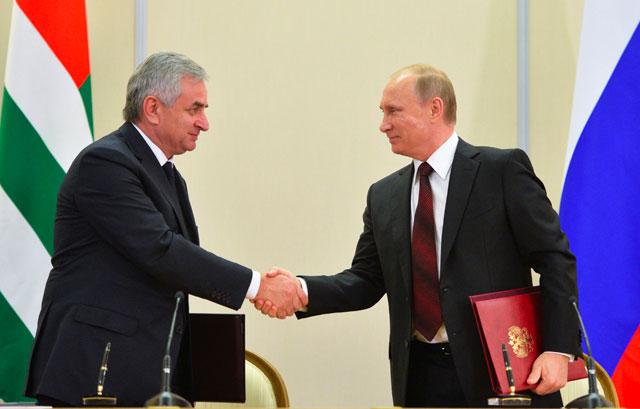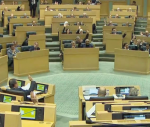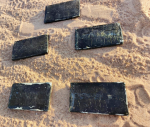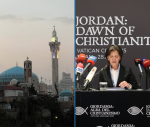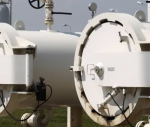You are here
Putin surveys the map as he ponders next move on Ukraine
By Reuters - Feb 23,2015 - Last updated at Feb 23,2015
MOSCOW — In Russia, Vladimir Putin likes to portray himself as the saviour of the nation. In Europe and the United States he has come to be seen as a threat to the new world order.
What the Russian president does next in Ukraine is key to the country's future, as well as that of Europe and his own.
Putin looks to have the upperhand at this stage despite Western economic sanctions that are hurting Russia's economy, as Ukraine is rapidly becoming all but ungovernable for its pro-Western leaders, undermining its drive to join mainstream Europe.
With Crimea in Russian hands for almost a year and eastern Ukraine controlled by separatists loyal to him, Putin could allow the rebels to try to seize more territory with what the West says is Russian military support.
Kiev fears a new rebel offensive is imminent on Ukraine's Sea of Azov coast which could open a corridor to Crimea.
Putin's next steps will be determined by what he thinks is best for him, and not necessarily by what Western critics see as expansionist policies or what his admiring electorate sees as the defence of national interests.
"All options are open," said a senior Western diplomat in Moscow. "But ultimately it is all about Putin keeping power and he will do what he has to do to achieve this."
The diplomat, with close knowledge of the negotiations which led to the peace deal reached by the German, French, Ukrainian and Russian leaders in the Belarussian capital Minsk on February 12, saw only a slim chance of a good outcome for Ukraine.
The best possible outcome, he said, was a return to the pre-conflict situation of 2013. Others included a long, intense war, or a "frozen" or low-level conflict in the east that makes Ukraine impossible to govern or tears it apart.
The setbacks to the Minsk deal since the rebels disavowed it by taking a strategic town they said was not covered by the truce have prompted new calls for US President Barack Obama to give Kiev lethal weapons to defend Ukraine.
"Vladimir Putin wants Ukraine not to be part of Europe, and he is succeeding in doing so," Republican Senator John McCain said in a television interview on Sunday.
Putin's map
For Putin, who denies sending troops and weapons to east Ukraine, the map of Russia and its "near abroad" is more comforting than a year ago.
Crimea has been reclaimed, and Ukraine's drive to join Europe's mainstream and possibly NATO seems more problematic now that Moscow has shown how far it will go to prevent this. Russian-speaking east Ukraine has not become part of Russia, but is now more in Moscow's sphere of influence than Kiev's.
Russia also dominates South Ossetia and Abkhazia, two breakaway regions of Georgia. Moscow recognised their independence after a five-day war with Tbilisi which Russia won in 2008 and has held sway there ever since.
Moscow signed a border agreement with South Ossetia last week, a move which Tbilisi said moved Russia closer to annexing the territory, and forged a "strategic partnership" agreement with Abkhazia last November.
Further afield, Russian forces have been deployed as "peacekeepers" in the Transdniestria region of Moldova since intervening to back separatists more than 20 years ago.
These may or may not be patterns for Putin to follow although the same Kremlin adviser, Vladislav Surkov, has a role in policy making for the Georgian regions as well as for Ukraine. Destabilisation of Ukraine, making it impossible to govern and take into NATO, may be preferable to conquering it.
Some Western officials see Putin's ambitions in other parts of the former Soviet Union.
British Defence Secretary Michael Fallon said last week Putin posed a "real and present danger" to Estonia, Latvia and Lithuania. Valdis Dombrovskis, vice president of the European Union's executive European Commission, said Russia was redrawing the map of Europe by force.
US State Department spokeswoman Jen Psaki said Russia was "undermining international diplomacy and multilateral institutions — the foundations of our modern global order."
US hegemony
Putin is challenging what he sees as US hegemony and a world order shaped around Washington's interests, where he believes the United States sets certain standards for others but does not adhere to them itself.
But more is at stake for Putin and Russia in Ukraine than in any other former Soviet republic: he says he sees it as one nation with Russia and the cradle of Russian civilisation.
A report released by the EU Committee of Britain's House of Lords signalled the European Union had not grasped this in the buildup to the crisis, identifying a "catastrophic misreading" of the mood in the Kremlin.
Sergei Karaganov, head of Russia's independent Council for Foreign and Defence Policy think tank, also believes the West got it wrong after the Cold War ended by failing to understand Russia's concerns over Ukraine, and particularly that it might join NATO.
The consequences, he says, include a turn towards a strong leader in Russia and disenchantment with Western-style democracy and values.
But, like Putin, he says policy changes must come from Europe — not from Russia — to reduce the chances of conflict.
His comments underline that, a year since the overthrow of a Moscow-leaning president in Ukraine that culminated in the separatist rebellions in the east, the gulf between Moscow and the West is as dangerously wide as ever.
"After winning the Cold War, the whole of Europe is losing it now," Karaganov wrote in Rossiiskaya Gazeta newspaper last week. "And it is entering the next phase of international relations disunited, again on the verge of confrontation or even a major war."
Related Articles
Russia cemented control over neighbouring Georgia's rebel Abkhazia region Monday with a "strategic partnership" deal that the Georgian government said amounts to annexation.
Russia launched major military exercises Thursday, with thousands of troops taking part in war games across the country, including in the annexed Crimean peninsula and southern regions near Ukraine.
DAMASCUS — Moscow ally Syria on Wednesday recognised the independence of eastern Ukraine's two separatist republics, making it the first sta


